April 20, 2018
Air Date: April 20, 2018
FULL SHOW
SEGMENTS

The Amazon as Legal Person
View the page for this story
Colombia’s Supreme Court ruled that 25 young plaintiffs have a right to a safe and healthy environment in the years ahead. To that end the high court ordered the government to halt deforestation of the Colombian part of the Amazon, and granted the river and tropical forest the legal standing of a person, so ‘guardians’ can sue on its behalf for protection. Host Steve Curwood discussed the significance of this historic ruling with University of British Columbia law professor, David Boyd, author of the book “The Rights of Nature.” (08:56)
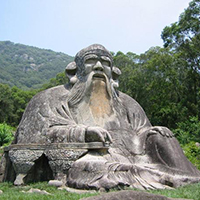
Ancient Wisdom for Earth Day
View the page for this story
Earth Day was born 48 years ago out of anger at the vast neglect and harm being wreaked on the planet. Host Steve Curwood reflects on the state of our only home today and how by adopting the principles of love, sincerity, kindness and support for others urged by the Chinese philosopher Lao-Tzu, we might better protect the environment today and for all our future. (02:38)
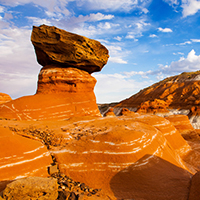
Beyond The Headlines
/ Peter DykstraView the page for this story
This week, we look Beyond the Headlines at a cut-rate sale of public land leases to fossil fuel companies spearheaded by Interior Secretary Ryan Zinke; also a high court ruling that could ban diesel cars in Germany’s most polluted cities. And from the history books, Peter Dykstra reminds us about a toxic chemical plant explosion near the New Jersey Turnpike that rocked the New York metropolitan area. (04:04)
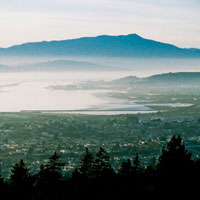
The Green Berkeley Hills – The Place Where You Live
/ Wong Yoo-ChongView the page for this story
Living on Earth collaborates with Orion magazine’s “Place Where You Live” essay project, this time to focus on the rolling green hills of Northern California that writer Wong Yoo-Chong now calls home and reflects on a poem by the ancient Chinese sage, Li Po. (04:17)
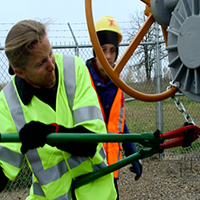
Valve-Turning Protestors
View the page for this story
On October 11, 2016, climate activists closed valves on five pipelines, halting most of the oil flowing into the US from Canada’s oil sands. They waited for arrest, went quietly, and faced criminal charges in court. Writer Michelle Nijhuis profiled these “Valve Turners” for The New York Times Magazine and explains to host Steve Curwood why these five activists feel such urgency to risk legal jeopardy in order to stop what they see as the catastrophic damage humans are causing to the climate. (10:17)

A Pipeline Eco Engineer Protests
View the page for this story
Romilly Cavanaugh once worked as an environmental pipeline engineer for Trans Mountain, a unit of Kinder Morgan that’s now trying to expand a Canadian tar sands oil pipeline. After she quit she became alarmed by global warming, and on March 20 she joined 200 protestors trying to block pipeline construction. She now awaits trial for criminal contempt of court. The pipeline would nearly triple oil sands flowing to the Port of Vancouver and would cross First Nations territory. Worried by strong opposition, Kinder Morgan wants government legal and financial guarantees to continue. Ms. Cavanaugh told host Steve Curwood about her convictions on the need to curb climate-changing gas emissions, protect the land and water from oil spills, and to respect Indigenous rights. (16:18)
Show Credits and Funders
Show Transcript
HOST: Steve Curwood
GUESTS: David Boyd, Wong Yoo-Chung, Michelle Nijhuis, Romilly Cavanaugh
REPORTERS: Peter Dykstra
[THEME]
CURWOOD: From Public Radio International, this is Living on Earth.
[THEME]
CURWOOD: I’m Steve Curwood. Young people win a landmark judgment in Colombia’s highest court – the Amazon has the same basic rights as people that the government must respect and protect.
BOYD: For too long we've seen nature as merely a basket of commodities or natural resources for human beings' use and exploitation. And what the court says is that nature is actually a community to which we belong and not a commodity for us to exploit.
CURWOOD: Also – a verse from the ancient Chinese poet Li-Po.
YOO-CHONG: Asked why I live in these green hills,
I smile and do not answer; my heart is naturally calm.
Peach blossoms riding a stream vanish in mystery.
CURWOOD: Poetry and prose for Earth Day and more this week on Living on Earth – Stick Around!
[NEWSBREAK MUSIC: Boards Of Canada “Zoetrope” from “In A Beautiful Place Out In The Country” (Warp Records 2000)]
[THEME]
The Amazon as Legal Person
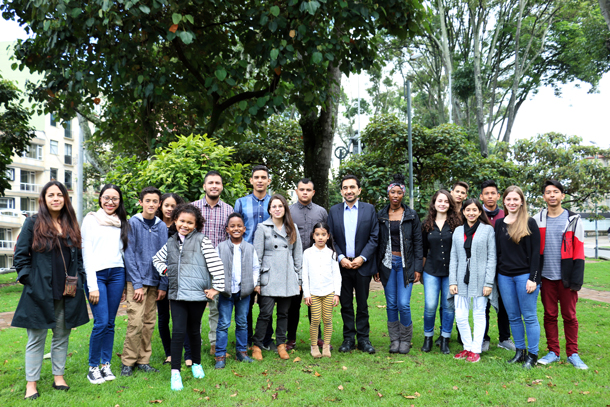
The 25 youth plaintiffs hail from 17 different cities in Colombia, including 4 from the Amazon. (Photo: Courtesy of Dejusticia)
CURWOOD: From PRI, and the Jennifer and Ted Stanley Studios at the University of Massachusetts, Boston, this is Living on Earth. I’m Steve Curwood. In an historic case in Columbia, 25 young plaintiffs sued the government for their right to a safe environment and recently won protection for the Amazon at the Supreme Court. Lead plaintiff Valentina Rozo –
ROZO: I feel incredible. We are in total 25 of us. We are between the ages of 7 and 26 and we come from 17 different cities in Colombia. Four of them live in the Amazon and that's also great because, well they are the most directly affected. So it's important because we can show that we as young people, and especially for someone that is seven years old, he doesn't have to be a president or a minister to make a change and to be listened [to]. So, you don't have to have power to create something big.
CURWOOD: The case is part of a growing global movement where young people are challenging governments to combat climate change and protect future generations.
The Supreme Court granted the Colombian portion of the Amazon tropical forest the status of “personhood”, so the forest has rights under the law. Lawyer David Boyd joins us – he teaches at the University of British Columbia, and is author of The Rights of Nature. Welcome back to Living on Earth David!
BOYD: Well, it is absolutely delightful to be back with you, Steve.
CURWOOD: Talk to me about this ruling by the Colombian Supreme Court of Justice. What exactly does it say, and what does it entail, in brief?
BOYD: Well, this is an extraordinary ruling by Colombia's Supreme Court, in a case that was brought on behalf of twenty-five Colombian children, by a human rights organization called Dejusticia. And basically what these children argued in court is that their fundamental right to live in a healthy environment, one of the most sacred human rights that there is, is being violated by deforestation in the Colombian Amazon rainforest, which not only is impacting water in Colombia, but also has significant effects on climate change because deforestation releases carbon to the atmosphere and exacerbates the global climate crisis.
CURWOOD: So what does this tell us in terms of global trends, and what kind of legal precedent is this court setting?
BOYD: Well, this is actually part of a line of cases that dates back twenty-five years to an extraordinary case in the Philippines that was brought by a Filipino lawyer named Tony Oposa on behalf of his children and a group of other Filipino children, in which Tony Oposa argued that deforestation in the Philippines was violating those children's right to live in a healthy environment under the Filipino Constitution. And in 1993, the Supreme Court of the Philippines agreed with Tony Oposa that that was indeed the case, and that really is kind of the grandmother of all of these cases being brought today on behalf of children in countries all over the world. So this Colombian case is the latest, but it's also the first in the world where a court has really tackled this issue of deforestation, and made the connection between deforestation and climate change.
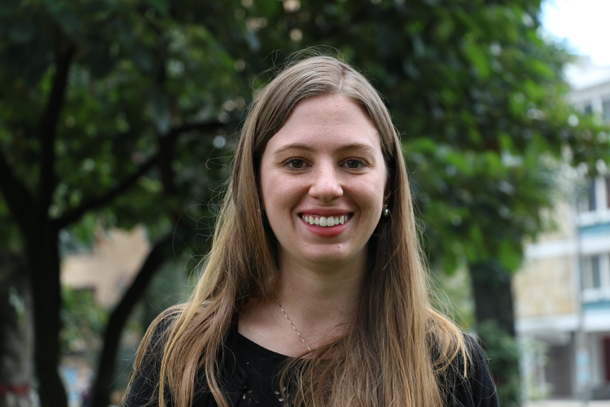
Valentina Rozo is a researcher with Dejusticia and one of the plaintiffs in the case. (Photo: Courtesy of Dejusticia)
CURWOOD: Now, what's the main argument of these young plaintiffs?
BOYD: The main argument is really quite simple - it's that they have rights under the Colombian Constitution - the right to life and the right to a healthy environment, and the impacts of deforestation are clearly, scientifically proven to be adversely affecting those rights.
CURWOOD: David, now what about this aspect of the decision that grants nature personhood. The court is saying, not only should you protect these trees, but in fact, these trees have the right to exist.
BOYD: Yeah, well, this is another fascinating part of the court's decision. The court really goes into great detail talking about how it's absolutely vital for the government not only to stop deforestation, but for society more broadly to re-evaluate and reorient our relationship with the natural world. For too long we've seen nature as merely a basket of commodities or natural resources for human beings’ use and exploitation. And what the court says is nature is actually a community to which we belong and not a commodity for us to exploit. And, in recognizing that the Amazon rainforest has the legal rights of a person, what that does is that shifts our relationship with nature in a profound way and says, we have really sacred legal obligations to protect and restore the Amazon rainforest, and those responsibilities fall upon the shoulders of the President of Colombia, the Ministry of Environment, the Ministry of Agriculture, and the people of Colombia.
CURWOOD: Under the law in America, corporations are treated as persons in the court system. What's the effect on these natural systems of giving them personhood?
BOYD: Well, the effect on natural systems is that - two things. One is that they have rights that are recognized in our legal system, so their situation has been transformed from objects to subjects, and as subjects they have rights that can be enforced in the legal system. So we've seen, for example, in Ecuador, a case in which the constitutional rights of a river led a court to order the government to carry out an ecological restoration project on the Vilcabamba River. In the context of the Amazon, the fact that the Amazon is now designated as a legal person means that it has legally enforceable rights, and if the government fails to develop an action plan for deforestation -- to achieve zero deforestation – then, lawyers on behalf of children or the Amazon itself can go back to court in Colombia and enforce those legal rights. So it really is quite a game changer from a legal perspective.
.jpg)
In Colombia, the Amazon rainforest can now enjoy rights of personhood under the law as a result of a Colombian Supreme Court ruling. (Photo: Neil Palmer/ CIAT, Wikimedia Commons CC BY-SA 2.0)
CURWOOD: Of course, going way back it's always been Mother Nature.
BOYD: Yeah, I mean. And the science of this is really remarkable. I mean, we are literally -- we share DNA with every other form of life on the planet -- from bacteria, to old growth forests, to elephants. We all are related. We all emerged from the primordial soup billions of years ago. We've of course evolved in different ways, but we are, scientifically speaking, part of the family of life on this planet. And for far too long we’ve behaved quite selfishly and really, recognizing the rights of nature is just a way of returning to a perspective that says this is our family and we're going to treat our family with respect.
CURWOOD: Now, why is this ruling so important at this moment?
BOYD: Well, this legal ruling really brings together two fascinating global trends. One is that we're seeing a real upsweep in children filing lawsuits, in lawyers representing children in court. So we've seen -- I mentioned a case in the Philippines, but there have been cases in the Ukraine, in Uganda, in Norway. There's a case pending in Portugal. There's the Juliana vs. the United States case, which is proceeding through the American courts.
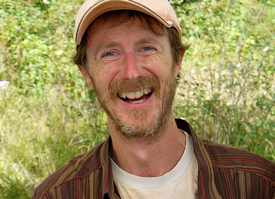
David Boyd is an environmental lawyer and professor at the University of British Columbia. His latest book is The Rights of Nature: A Legal Revolution That Could Save the World. (Photo: Courtesy of David Boyd)
So that's one avenue -- or one trend -- that's really increasing globally. And the other trend that it's linked to is the recognition that nature has rights. And so when you put together these two different avenues of progress, recognition of the rights of nature and recognition that children have a right to live in a healthy climate, what you have is a really explosive mix of transformative potential. So these two different global trends, in tandem, have the potential to really transform our world in a positive way from an ecological perspective.
CURWOOD: So, the High Court in Colombia has said that nature has rights, particularly the Amazon and its trees. What did it order the government to do as a result of this ruling?
BOYD: Well, it ordered the President, the Minister of Environment, and the Minister of Agriculture to sit down and hammer out an action plan within a period of four months that will result in zero deforestation by 2020. So, in other words, the Supreme Court of Colombia has put the government of Colombia on a very tight leash. That's the first part of their court order. The second part of the court order is even broader and requires the government to work with indigenous peoples, local communities, and scientists to come up with what the court calls “an intergenerational pact for the future life of the Amazon”. So, this is a really broad and sweeping plan that will be intended to protect this majestic ecosystem for all time. And the other really fascinating part of the court's judgment is that they gave the government 48 hours to get started. So, there's no room for delay here. The court has really remarkably expressed the urgency of its order by saying you've got to hit the road, Jack, and get going on this within the next two days.
CURWOOD: David Boyd is a professor of law policy and sustainability at the University of British Columbia. Thank you so much for taking the time with us today!
BOYD: Well, thanks for having me on Steve. It's a real pleasure.
Related links:
- Read key excerpts from the Colombian Supreme Court ruling here
- Learn more about Rights of Nature
- Living on Earth’s earlier interview about Prof. Boyd's book The Rights of Nature
- Watch: YouTube video that explains the basis for the youth lawsuit (with English subtitles)
[MUSIC: Wynton Marsalis, “Sister Cheryl” on Wynton Marsalis, composed by Tony Williams, CBS Records]
Ancient Wisdom for Earth Day
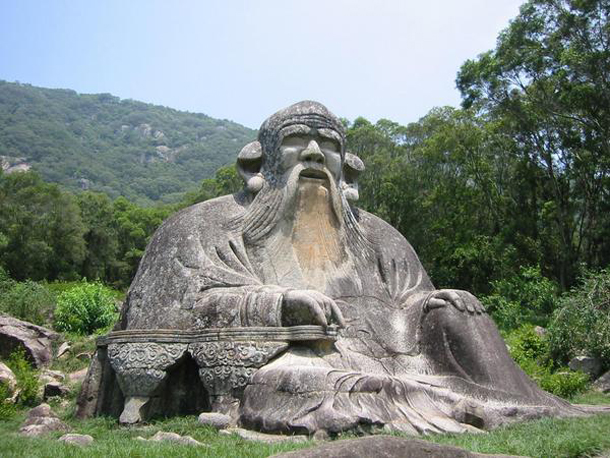
A stone sculpture of the ancient Chinese philosopher Lao-Tzu. (Photo: Wikimedia Commons)
CURWOOD: Two score and eight years ago some 20 million people showed up to say ‘no’ to the way humans were treating our planet, and Earth Day began. Eagles were in trouble, rivers were on fire, and the dirty air choked folks from New York to Los Angeles. Some things have improved, but much is still terribly wrong. Even though we know better, we are about to flood and fry civilization as well as nature with global warming, the air is way too toxic in many places, and a sea of synthetic chemicals and plastics endangers health. We could blame politics of course: one doesn’t have to look further than the Trump Administration’s efforts to cripple the Paris Climate Agreement, unchain dangerous chemicals or turn our wilderness into sources of yet more global warming, to point a finger. But in a democracy that finger points right back at us. Those who simply blame ‘the system’ forget that it is the product of we humans, and that if it’s broken—and indeed it is—we can fix it.
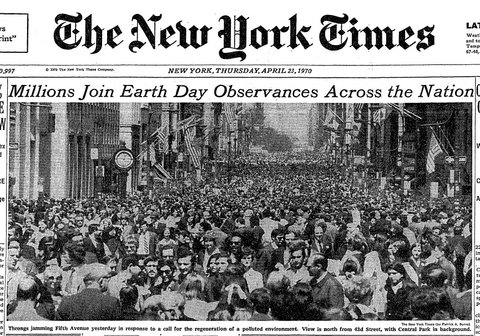
The first Earth Day took place on April 22, 1970. (Photo: New York Times)
But how?
There are many answers, and the lawsuits brought by young people is one answer. Another comes from Lao Tzu the great thought leader of ancient China, and we’ll have a bit more on him later in the program, but right now let’s consider his four rules for happy and harmonious living in balance with nature.
Number one is the love and reverence for all living beings, not just the ones we like. In other words, noisy crows and dandelions deserve unconditional love just like our dearest family and friends.
Number two is natural sincerity—being honest and living in the truth.
So let’s not kid ourselves that filling one more wetland or spraying one more pesticide or buying one more gas-guzzler won’t hurt.
Number three is kindness—a nonviolent and gentle approach takes away the occasion for war, whether at the kitchen table or between nations—and war is a super polluter. And number four is supportiveness—being there for each other freely, without expecting something in return.
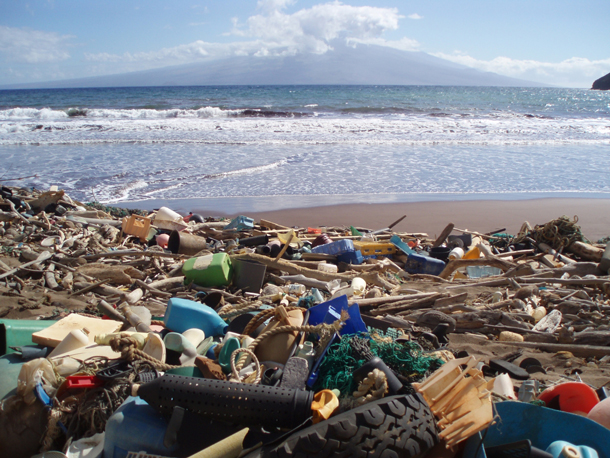
Trash washed up on a Hawaiian beach. (Photo: NOAA)
I recall one day a bird was trapped inside my backyard gazebo, banging into the screened windows trying to escape; but when I spoke quietly she let me come near, and cup her in my hands. When I opened the door and released her, she flew to a nearby branch, turned and seemed to thank me. The thanks was just a bonus; freeing her had already made me happy. And so if we follow the rules of Lao Tzu and love nature, be gentle and honest, and truly help all creation, we can make Earth Day celebrations resonate with “Yes”!
Related link:
Azriel ReShel's essay on Uplift: 'Lao Tzu's Four Rules for Living
[MUSIC: Wynton Marsalis, “Sister Cheryl” on Wynton Marsalis, composed by Tony Williams, CBS Records]
CURWOOD: Coming up, a poet answers the people from the mountain. That’s just ahead on Living on Earth, keep listening!
ANNOUNCER: Support for Living on Earth comes from the Gordon and Betty Moore Foundation, and from a friend of Sailors for the Sea, working with boaters to restore ocean health.
[CUTAWAY MUSIC: Phil Scarff, “Kajri Dhun” on Ragas on Saxophone, traditional Indian/arr.Phil Scarff, Galloping Goat Productions]
Beyond The Headlines
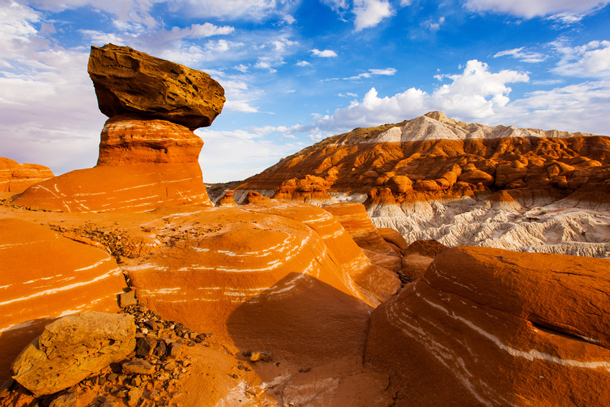
Grand Staircase-Escalante National Monument is under threat from the Interior Department’s new oil and gas lease efforts, in addition to being downsized earlier this year. (Photo: James Marvin Phelps, Flickr CC BY-NC 2.0)
CURWOOD: It’s Living on Earth, I’m Steve Curwood. Time now for a look Beyond the Headlines with Peter Dykstra. Peter’s with Environmental Health News, that’s EHN.org, and DailyClimate.org. On the line now from Atlanta, Georgia where it is warm and sunny, I imagine, Peter.
DYKSTRA: Yes it is, and how you doing Steve? The, um, Secretary of Interior, Ryan Zinke, is undergoing what The New Yorker magazine has called a fire sale of public lands.
CURWOOD: Oh? So how do you have a fire sale with land?
DYKSTRA: You give ‘em away cheap, and you give ‘em away to your friends. The friends of the current administration would appear to be the fossil fuel industry, perhaps the mining industry. Secretary Zinke has set a large lease sale for Alaska for the oil and gas industry. Only one percent of those leases have been sold. There’s a huge offshore oil and gas lease – only ten percent of those leases were even bid on.
CURWOOD: So what’s the problem? Why does he have to sell this a cut-rate?
DYKSTRA: We’re not sure. But the reason that the fossil fuel industry may not be buying in is that gasoline at the pump or oil by the barrel are still pretty cheap and pretty abundant. So the oil and gas industry doesn’t have to start new projects; they don’t have to start projects like offshore drilling that by their nature cost more than the industry would make off them.

Volkswagen is one of several car companies penalized for lying about emissions from its diesel vehicles. Diesel cars risk being banned in some German cities. (Photo: Dave See, Flickr CC BY 2.0)
CURWOOD: And of course Mr. Zinke will stay away from the sensitive areas then if it’s hard to sell this stuff.
DYKSTRA: Uh, the sensitive areas, you mean like the national monuments that have been set up – Bears Ears and Grand Staircase-Escalante in Utah?
CURWOOD: Yeah.
DYKSTRA: The Interior Department in the Trump administration drastically slashed the size of those areas and is preparing to auction off leases near them.
CURWOOD: But I imagine that they won’t be able to get the money they want. Hey, what else do you have?
DYKSTRA: Well, we can move to Europe where the diesel scandal with Volkswagen and other companies, other car companies, is still feeling its pinch. There’s a German non-government organization, Environmental Action Germany. Their official German name is Deutsche Umwelthilfe, or DUH, which of course stands for “DUH.”
CURWOOD: [LAUGHS]
DYKSTRA: And they’ve taken the auto manufacturers to the highest court in Germany where they’ve won a decision that could result in cars being banned from some of the most polluted cities in Germany. There are 15 million diesel cars in Germany. We’re seeing the sales numbers go down year after year because the writing is on the wall for diesel cars.
CURWOOD: Hey, what do you have from the history vault for us this week?
DYKSTRA: We’re going to go back to my home state, my native state, New Jersey. Elizabeth, New Jersey to be precise. On April 20, 1980, ten years after the first Earth Day, the Chemical Control Company blew up. It burned for fifteen hours. There were tens of thousands of toxic drums on the site. It was a major fracas to celebrate that Earth Day tenth anniversary.
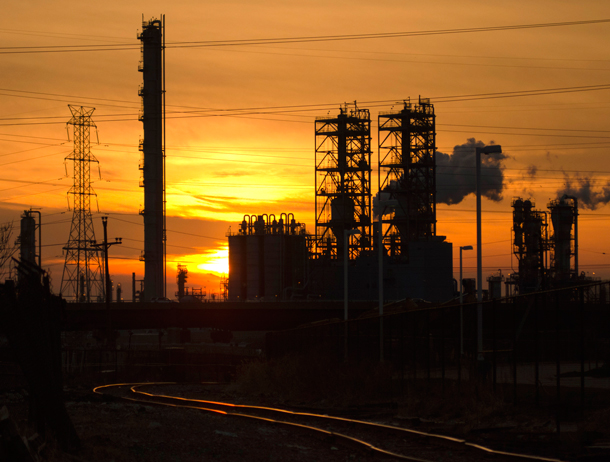
The explosion and fire at the Chemical Control Co. was near Exit 13 off the New Jersey Turnpike – not far from an oil refinery complex. If the fire had reached these petroleum tanks, the damage could have been even worse. (Photo: Bob Jagendorf, Flickr CC BY-NC 2.0)
CURWOOD:I think you could hear the blast in downtown New York, huh?
DYKSTRA: You could hear it all over the New York area. And there was a fear at one point that Staten Island, which was downwind from the blast, that large areas of Staten Island would have to be evacuated. There were drums of PCBs, pesticides, other toxic chemicals all mixed together and poorly kept track of.
CURWOOD: And hey, what exit was that on the New Jersey Turnpike?
DYKSTRA: It was Exit 13.
CURWOOD: But that’s down by the refineries – what about the gasoline?
DYKSTRA: Right. That’s the area of the Jersey Turnpike where you have to roll up the windows just to drive by. There were storage tanks nearby – not just for gasoline, but for natural gas and propane – and if the fire, which burned for fifteen hours, had gotten to those tanks, the disaster could have been many, many times larger.
CURWOOD: Ooo, okay, well – unlucky, but lucky it sounds like. Peter Dykstra’s with Environmental Health News, that’s EHN.org, and DailyClimate.org. We’ll talk to you again real soon.
DYKSTRA: All right, Steve thanks. We’ll talk to you soon.
CURWOOD: And there is more on these stories at our website, LOE.org.
Related links:
- The New Yorker: “Ryan Zinke’s Great American Fire Sale”
- Yale e360: “End of the Road: Are Diesel Cars on the Way Out in Europe?”
- Chemical Control Co. explosion
[MUSIC: Speedo Harmonica Jones, “Cheapskate Mike” on Indescribably Blue, not commercially available, info at https://www.facebook.com/speedoharmonica/]
The Green Berkeley Hills – The Place Where You Live
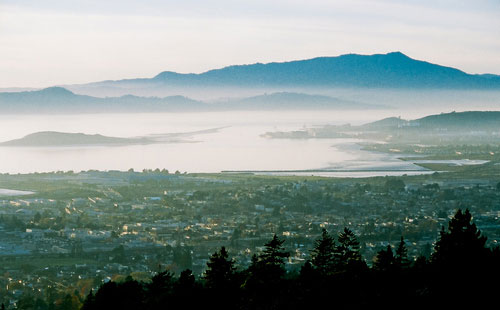
Mount Tamalpais, rising half a mile from the sea across the Bay. (Photo: Wong Yoo-Chong)
CURWOOD: This week in honor of Earth Day, April 22nd, and to mark Poetry Month we revisit a favorite spot in the Living on Earth/Orion Magazine series “The Place Where You Live.” Orion invites readers to capture their home or favorite place and submit essays to their website, and we give them a voice.
[MUSIC: Edward Sharpe & The Magnetic Zeroes “Home” from Edward Sharpe and The Magnetic Zeroes (Rough Trade Records 2009)]
CURWOOD: Our writer today was born half a world away -- but for over forty years he's turned his eyes to the green hills of California for solace and help.
YOO-CHONG: My name is Wong Yoo-Chong, I live in Berkeley, California. I have been working on a translation of the Lao-Tzu for the past four years. And I’m about halfway done. I never come down from these hills without some insights, some epiphanies from the work on my desk. Once I leave it, I get new angles and new insights, so going up to these hills is a very crucial part of my writing.
CURWOOD: It's not just the philosophy of Lao-Tzu that inspires Wong Yoo-Chong. Before he read his essay he shared a poem by the eighth century Chinese poet, Li Po titled, "Answering the Common People from the Mountains."
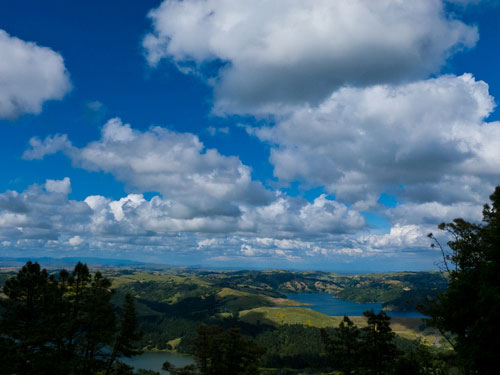
Winter clouds drift by to keep these grazing hills green and the reservoirs full in order to collect enough to quench the thirst of millions. In the horizon, just beyond the verdant landscape, suburbs begin again. (Photo: Wong Yoo-Chong)
YOO-CHONG: (In Chinese, then English): Asked why I live in these green hills,
I smile and do not answer; my heart is naturally calm.
Peach blossoms riding a stream vanish in mystery,
Another world, not the human realm.
[MUSIC: Nguyen Le’ “Are You Experienced” from Purple: Celebrating Jimi Hendrix (ACT Music 2012)]
YOO-CHONG: My green hills are the Berkeley Hills. These hills run parallel to the coast and fault lines, in a northwesterly direction. They have been jolted into their present form by tectonic upheaval of the earth’s crust. The famous San Andreas Fault runs under the ocean beyond the Golden Gate, but a mile away, the Hayward Fault knifes through houses and streets. It last shook in 1868.
An hour’s walk from my door is Wildcat Peak, where Nike missiles stood guard against Russian Migs and bombers. Also gone are the Ohlone and Miwok, the indigenous people who once inhabited these hills.
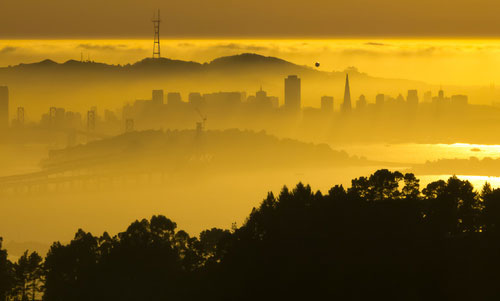
An afternoon sun arches over San Francisco. The tortoise shell shaped hill in the middle is Yerba Buena Island; in the foreground is the silhouette of a ridge of the Berkeley Hills. (Photo: Wong Yoo-Chong)
Walking here for forty years, I’ve enjoyed the sound of crunching leaves and bird chorus. I’ve met kestrels, crows, deer, foxes, and white-tailed rabbits. From these hills I can see the City high-rises in the western sky; in the east are ranch homes on half-acre lots along the Calaveras Fault. Looking down, I often find rattlers or gopher snakes in my path. Looking up I see circling red-tailed hawks, turkey vultures and migrating geese in huge V’s. Up in these hills is a different world.
CURWOOD: That's Wong Yoo-Chong. And if you want to tell us about “The Place Where You Live,” head over to our website LOE dot org.
Related link:
Mr. Wong’s Original Essay in Orion Magazine’s The Place Where You Live
[MUSIC: Nguyen Le’ “Are You Experienced” from Purple: Celebrating Jimi Hendrix (ACT Music 2012)]
Valve-Turning Protestors
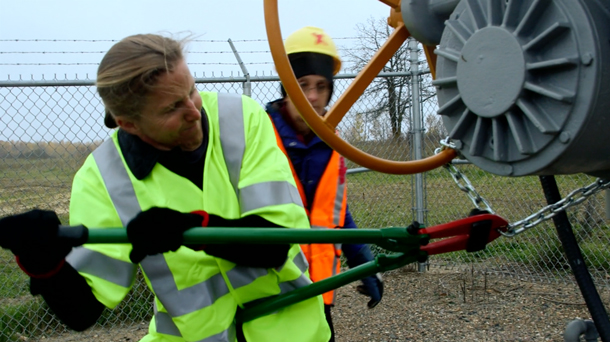
Emily Johnston uses heavy-duty clippers to break a chain on a shut-off valve for an Enbridge pipeline in Minnesota as Annette Klapstein looks on. The two women together shut down Enbridge Lines 4 and 67 on October 11, 2016. (Photo: The Valve Turners film, courtesy of Steve Liptay)
CURWOOD: Many environmental activists join rallies or marches, sign petitions and lobby legislators. But some feel the need for more drastic steps. On the morning of October 11, 2016, five activists halted the flow of crude oil through five different pipelines along the U.S.-Canada border, from Washington State to Minnesota. They’re known as “The Valve Turners”, and they argue their illegal acts constitute necessary civil disobedience, in the face of climate change driven by the burning of fossil fuels. In a recent New York Times Magazine article, writer Michelle Nijhuis tells the story of how the Valve Turners came to turn, turn, turn. Michelle, welcome to Living on Earth!
NIJHUIS: Thanks for having me, Steve.
CURWOOD: What prompted you to write this story?
NIJHUIS: Well, I've been interested in radical environmental activists for a long time. Not because I necessarily condone or agree with their actions, but because they are so unusual in that, for them, environmental issues are an urgent priority, and as someone who's written about environmental issues for a long time I know just how unusual that is. Even most of us who care about environmental issues tend to put them aside when something we see as more urgent, more pressing, comes into our lives. So, radical environmental activists are among the few people who are really willing to disrupt their lives for issues that a lot of us see as distant or abstract concerns.
CURWOOD: In other words, it's uncommon to find people who are willing to go to jail for their beliefs.
NIJHUIS: Especially for problems that most of us see as abstract or distant.
CURWOOD: Now what exactly did the Valve Turners do on that day, October 11, 2016?
NIJHUIS: Well, on the morning of October 11th, the Valve Turners shut down four cross-border pipelines in Washington, Montana, and Minnesota. They cut the locks on the fences that were around the valves. They turned these emergency valves so that the pipelines were turned off. And, together, those pipelines carried nearly seventy percent of the crude oil imported to the United States from Canada. So for several hours, a large part of the oil we get from Canada was not flowing into the country.
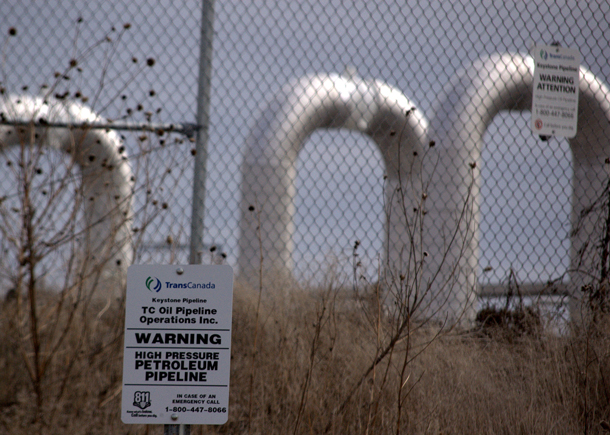
The Keystone Pipeline, which Michael Foster temporarily shut down, transports diluted bitumen and crude oil synthesized from tar sands from Alberta into the United States. (Photo: shannonpatrick17, Flickr CC BY 2.0)
CURWOOD: So, what were they trying to accomplish? I mean, just for a few hours obviously they shut down those pipelines. That didn't exactly stop that importation of oil from Canada.
NIJHUIS: Right, and it was to a large extent a symbolic action and I think they would all say that. Michael Foster, who was the main character in my story, said that he really got some visceral satisfaction from stopping what he would call poison from being emitted into the atmosphere. He would say, you know, look I have done so much work against climate change but have I really stopped any carbon emissions? No, this is the first time I've done that. But strategically I think what they were up to is they wanted to wake up people who were sympathetic, but complacent. And then they also wanted to point a finger at the fossil fuel companies, who are really the largest emitters of greenhouse gases on the planet.
CURWOOD: So, how would you characterize the Valve Turners?
NIJHUIS: They’re unlike the typical radical activist in that they're a bit older. The youngest member of the group is fifty. Most of them are churchgoers. As I say in the story, most of them wear sensible shoes. They're all white. Several of them are grandparents. None of them is truly poor, some of them are voluntarily poor, but they're all fairly comfortable economically. And none of them are facing an immediate threat from climate change. You know, their house is not flooding, their crops are not being flooded either, and they all say that they feel like those advantages give them a kind of responsibility to take the kind of actions that they've taken. And I would describe them as really humble people. Not necessarily shy, but not doing this because they enjoy performance, or they enjoy setting themselves apart from the rest of humanity. Even the jurors I talked to who were very, very critical of what the Valve Turners had done, recognized that their convictions were genuine and that they were truly motivated by their convictions.
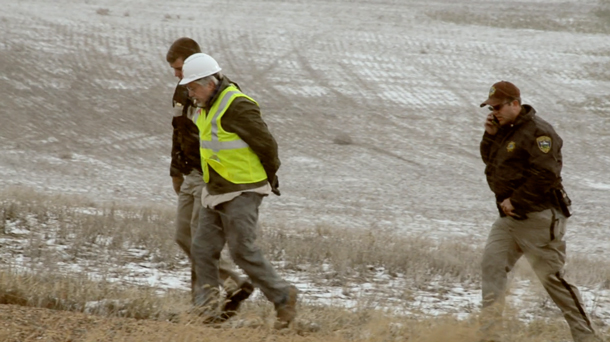
Two officers escorted Leonard Higgins to a patrol car after he closed a shut-off valve on the Enbridge Express Pipeline in Montana. (Photo: The Valve Turners film, courtesy of Steve Liptay)
CURWOOD: I imagine it was more than one graduate degree among them.
NIJHUIS: Yes, they're all college educated, and a couple of them have studied divinity.
CURWOOD: Let's talk first about Michael Foster. That's the man you focus on in your article. Who is he and what motivated him to shut this part of the Keystone Pipeline?
NIJHUIS: Well, Michael Foster is a fascinating person. He was born in Houston, Texas. He was raised by his grandparents. His grandfather worked for the Shell Oil refinery. And Michael grew up supporting the development of fossil fuels, as most people in Texas did at the time. And as he grew older, he became an environmentalist, and he grew aware of the problem of climate change. And as he describes it, he kept hearing about it and kept thinking someone would fix it and no one fixed it. He became trained as a climate change communicator by Al Gore. He gave lots of presentations to school groups. He did lots of what you would call “conventional activism”, and he just became more and more frustrated that no one was treating climate change as the emergency he felt it was. His kids are a huge motivation for what he's done, and as he saw it, his opportunities for doing something to benefit them, to stabilize the climate for them, were running out.
CURWOOD: Michelle, briefly, who are the other four Valve Turner activists?
NIJHUIS: The other four are Ken Ward, who gained some notoriety in environmental circles a few years ago for a similar action he carried out on the East Coast. He put a lobster boat in the way of a coal freighter on the coast of Massachusetts. There's Emily Johnston, who is a poet and writer who lives in Seattle and a long time environmental activist. Annette Klapstein, who was an attorney for the Puyallup tribe in Washington for many years, and is now more or less a full time activist. And then Leonard Higgins, who is a retired state employee in Oregon, and a very dedicated Unitarian. A lot of his activism comes from his faith.
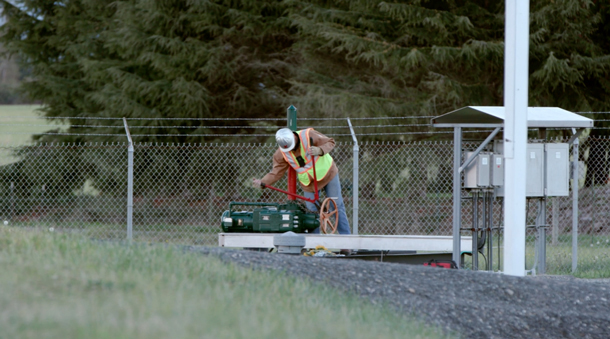
Ken Ward cuts a chain on Kinder Morgan’s Trans Mountain pipeline near Mount Vernon, Washington. (Photo: The Valve Turners film, courtesy of Steve Liptay)
CURWOOD: To what extent did the authorities view this as a widespread conspiracy, and move forward with some pretty tough laws that are aimed at terrorists?
NIJHUIS: Yeah Michael and his codefendant were charged with conspiracy, which was a surprise because his codefendant was merely filming the events. And so, North Dakota took a hard line, as hard a line as possible, against these activists. That was not the case in Washington State. So, it varies state by state. The outcomes, of course, vary judge-by-judge, and jury-by-jury. And the range of opinions that I found in interviewing jury members was really wide ranging.
CURWOOD: In your mind, what separates the Valve Turners from radical activist groups like Earth First and the Earth Liberation Front?
NIJHUIS: Well, back in the 80s and 90s, and even the early 2000s, groups like Earth First and the Earth Liberation Front were sabotaging science labs. They burned a ski lodge in Colorado. And they did that all anonymously. They would carry out an action in the middle of the night, and run away. And, that allowed opponents of the environmental movement to say, “all these environmentalists are terrorists. We really have to be concerned about this movement. It's out to hurt people, to cause damage.” And so I think the Valve Turners would distinguish themselves from those groups in several ways. They would say, “well, we're committed to nonviolence.” They knew they were going to cause minor property damage, but they did not want to cause major property damage. And perhaps just as importantly, we're going to commit these actions, and then we're going to wait to be arrested, and we're going to show up in court, and we're going to explain why we did that. They see that explanation of their motivations just as important as what they did with bolt cutters at the Keystone Pipeline.
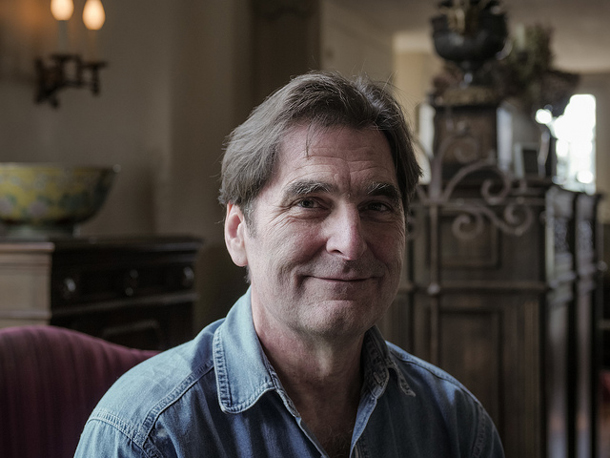
The October 11th, 2016 action was not the first time Ken Ward, above, faced criminal charges for his climate activism. In May 2013, aboard a lobster boat christened the Henry David T., Ward, he and fellow activist Jay O’Hara blocked a coal ship from entering a Massachusetts port. (Photo: Public Herald, Flickr CC BY-NC-ND 2.0)
CURWOOD: Now, when Ken Ward came to trial in Massachusetts, and famously the local district attorney said, “You know what? We shouldn't prosecute this person.” So, actually, there never was a full trial. But, in the discussions, was the concept of the necessity defense -- that is, sometimes people have to break the official law in order to obey a more important situation, or a higher law. To what extent did the Valve Turners use this as a defense in their trial?
NIJHUIS: Well, the necessity defense was a large part, and still is a large part of their strategy. And the necessity of defense has been invoked by activists before them, by anti-nuke activists, by anti-abortion activists. All of whom argue that, “look, under the necessity defense, we are allowed to commit crimes to avert a clear and present danger, if we have no legal alternative.” And that's generally understood to mean, you know, you're allowed to break into a house if it's burning down and you want to save the people inside. And they’re saying the necessity defense should be expanded to include these global threats. And we have, they would say, look we've tried every legal strategy we can think of, and they haven't worked, and we see this as an emergency, and time is running out, so we had to act. That defense has been rejected in three of the trials, three of the Valve Turners trials, and it is still being considered in the fourth. So, it's rarely admitted by judges, but activists feel that continuing to present the necessity defense is something that allows them to tell their story in a public forum.
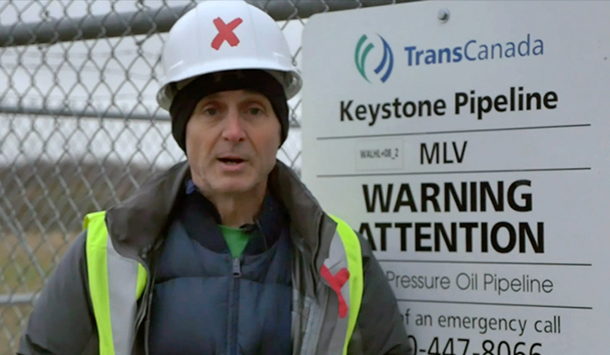
Michael Foster received the most prison time of the Valve Turners: a North Dakota judge sentenced him to three years in prison (with two of those years to be suspended and served on supervised probation). Mr. Foster could have faced up to 21 years in prison. (Photo: The Valve Turners film, courtesy of Steve Liptay)
CURWOOD: Michelle Nijhuis is a writer for The New York Times Magazine. Thanks for taking the time with us today, Michelle!
NIJHUIS: Thank you, Steve.
Related links:
- The New York Times Magazine: “‘I’m Just More Afraid of Climate Change Than I Am of Prison’”
- The Seattle Times: “Montana pipeline protester avoids jail, must pay restitution”
- Watch: The Valve Turners short film
[MUSIC: Wynton Marsalis, “Twilight” on Wynton Marsalis, CBS Records]
CURWOOD: Coming up, a former pipeline engineer protests against them. That’s just ahead here on Living on Earth, stay tuned.
ANNOUNCER: Funding for Living on Earth comes from you our listeners, and United Technologies - combining passion for science with engineering to create solutions designed for sustainability in aerospace, building industries and food refrigeration. UTC companies such as Otis, Carrier, Pratt & Whitney and UTC Aerospace Systems are helping to move the world forward. You can learn more about United Technologies by tuning in to the Race to 9 Billion podcast, hosted by UTC’s Chief Sustainability Officer. Listen at raceto9billion.com. That’s raceto9billion.com. This is PRI, Public Radio International.
[CUTAWAY MUSIC: Dean Shostak, “The Star Spangled Banner” on Revolutions, composed by John Stafford Smith, Dean Shostak Music]
A Pipeline Eco Engineer Protests
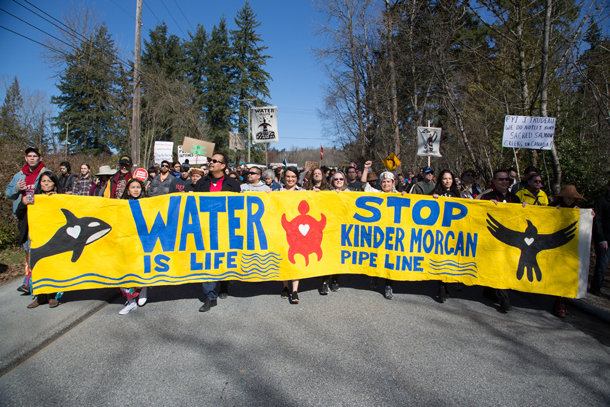
On March 10th, 2018, thousands marched in Burnaby, B.C., just outside Vancouver, to protest Kinder Morgan’s Trans Mountain Expansion project. (Photo: Zack Embree, Flickr CC BY-NC-SA 2.0)
CURWOOD: It’s Living on Earth, I’m Steve Curwood. There’s opposition to oil sands pipelines north of the border, as well. Activists in British Columbia are trying to stop Kinder Morgan’s Trans Mountain Expansion Project, which would nearly triple the flow of oil sands crude from Alberta to the port at Vancouver, Canada. The protestors say the project endangers the climate. And members of First Nations are contesting the pipeline in court, because half of it crosses their unceded territory. They say a spill could be disastrous for the local environment that they depend on for traditional foods and medicines.
Some 200 protestors have been arrested at the gate of Kinder Morgan’s Burnaby Terminal near Vancouver. The arrests were mostly peaceful.
[SOUNDS OF INDIGENOUS SINGING AND DRUMMING]
CURWOOD: Faced with this intense public pressure, Kinder Morgan recently threatened to scrap the $5.8 billion (US) project unless there’s assurance by the end of May that the legal challenges will be resolved. Canadian Prime Minister Justin Trudeau is vowing federal cash and more.
TRUDEAU: …we are actively pursuing legislative options that will assert, plus reinforce the Government of Canada’s jurisdiction in this matter, which we know we clearly have. We are going to get the pipeline built.
CURWOOD: Prime Minister Trudeau says the project is in Canada’s national interest. But a former environmental engineer who worked for Trans Mountain – now part of Kinder Morgan -- disagrees, and her protests at the Burnaby Terminal site led to her arrest and criminal charges. Her name is Romilly Cavanaugh. Welcome to Living on Earth!
CAVANAUGH: Thank you so much it's a pleasure to be with you.
CURWOOD: So, tell me -- you were trained as an environmental engineer; what exactly was your training?
CAVANAUGH: Yes that's correct. So I did my degree at University of British Columbia and I've been working for the last thirty years as an environmental engineer. So my primary focus when I worked at the pipeline was to respond to spills, to clean up spills, and also to work on obtaining permits for new construction. So there was some expansion that was done when I was there back in the ninety's, but it was on a much smaller scale than what's planned currently by Kinder Morgan which would take the throughput from three hundred thousand barrels per day to eight hundred ninety thousand.
CURWOOD: So you worked with them for five years; what changed about your perspective, why did you stop working for Trans Mountain?
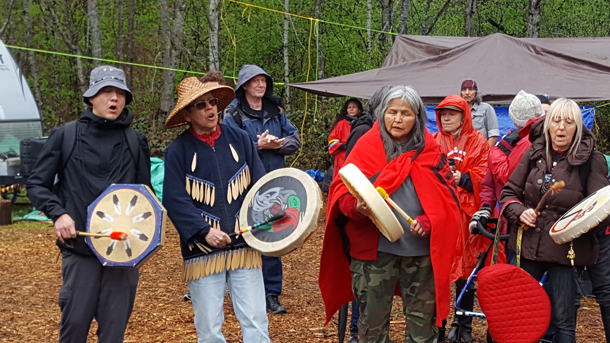
Members of First Nations sing and drum at the protestors’ training camp near the Kinder Morgan Burnaby Terminal. (Photo: Romilly Cavanaugh)
CAVANAUGH: Well I had reservations about working there from the beginning because there had already been the Exxon Valdez spill in 1989 and I started a couple years after that. So I already had some concerns about the industry in general; but I also had the feeling that if I worked within the environmental department we could at least do the best job possible in terms of environmental protection. So when we would apply for permits through the government we would look for rare and endangered species of animals and plants anywhere in the construction area. We would attempt to have as little disturbance as possible to rivers and creeks from construction; we would deal with issues like noise and dust. So to the best of our ability, minimize the impacts. But ultimately the industry is a dirty industry, we need to phase it out. There was a very funny cartoon that someone showed me when I worked there, and it was a cartoon of a pipeline with a valve, and there was a worker standing there with his hands on the valve. And beside him was a person who had a label underneath saying "An environmental manager at a pipeline company." And in one bubble he was saying, "Open the valve," because of course a company has to make money; and in the second bubble he was saying, "Close the valve," because there's really no way to have zero impacts from a fossil fuel industry. It is by its very nature a polluting industry. So that kind of summed up the entire experience I would say.
CURWOOD: [LAUGHS] Yeah I guess so!
CAVANAUGH: [LAUGHS] So the projects were pretty much rubberstamped from my perspective, so at some point it just became a very difficult place to work for me based on my convictions about environmental protection and Indigenous rights.
CURWOOD: Today, you don't work at Trans Mountain.
CAVANAUGH: No.
CURWOOD: You are working to stop the Trans Mountain pipeline expansion; why?
CAVANAUGH: That's correct. Because we're in a climate crisis; now is absolutely the wrong time to be investing in any more fossil fuel infrastructure. We should be moving away from this industry as quickly as possible at this point. So to be increasing the throughput on that pipeline by almost three times is just absolutely the wrong decision. So that's the main issue because it is a global issue, but there's also risks associated with the spill from the tankers. So, the tanker traffic comes from Burnaby, which is a suburb of Vancouver, but then passes basically through the city center of a metropolis with two million people, and then goes out into the Salish Sea where we have the endangered Orca whales. So there's the risks of spills as well that could impact our community as well as the environment. And there's just inadequate equipment available to deal with that, we've seen that with the Gulf of Mexico spill, the Deepwater Horizon, which did close to six billion dollars in damage to the economy there -- tourism, fisheries and other industries -- and widespread damage to the habitat there as well. So if we look back to what happened with the Exxon Valdez, a quarter of a million sea birds died; more than three thousand marine mammals were killed; billions of herring and salmon eggs were smothered. And for twenty years the local people fought to try to get restitution for the impacts to their livelihood. So the oil and gas industry doesn't want us to think about how they impact other industries or other communities; they just want Canadians to focus on job creation within the oil patch. And then there's the whole issue of indigenous rights. So there's just so many issues associated with this project.
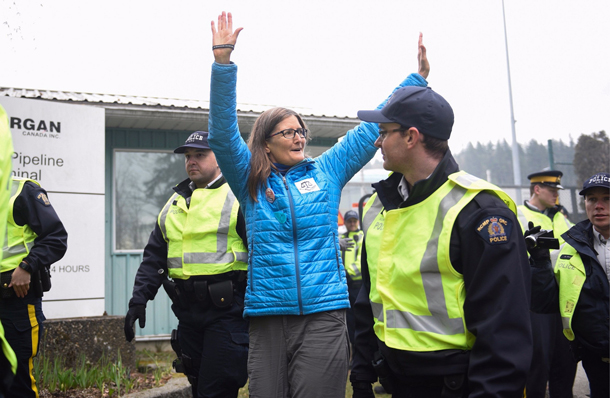
Mounties flank Romilly Cavanaugh as they escort her to a processing area for protesters arrested at the Burnaby Terminal, March 20th, 2018. (Photo: Rogue Collective, Flickr CC BY-NC-SA 2.0)
CURWOOD: The company says that they have robust technology for preventing and cleaning up spills.
CAVANAUGH: [LAUGHS] That's just not correct. So in the 1990s, when I was working at the pipeline, if there was a major spill into a marine environment, a successful outcome was for them to be able to contain about ten percent of the oil that was spilled. Very little has changed since then. So they're using pretty much the same technologies, some of the skimming equipment has improved. But they essentially will try to corral the oil using booms at the surface. It's basically almost like a rope for example, with a skirt underneath it, so if the oil doesn't remain at the surface there's no way for them to collect it. A portion of it will always be mixed into the water itself, and with this heavy oil that's coming from Alberta, some of it will sink to the ocean floor. They have no technology whatsoever for anything that doesn't remain on the surface. And then what we saw with the Gulf of Mexico was they tried to boom off the most sensitive habitats like the marshlands, and with wave action and with winds, the oil goes up and over the booms and ends up in those same areas that they're trying to protect. So the equipment is grossly inadequate.
CURWOOD: Why in your view is the Trans Mountain pipeline expansion such a threat to the global climate system?
CAVANAUGH: The oil sands itself is one of the biggest producers of greenhouse gas emissions in the world. It is a massive industrial site that covers two million acres of forest land. So any additional capacity to have oil transported from Alberta I see as a detriment to climate change.
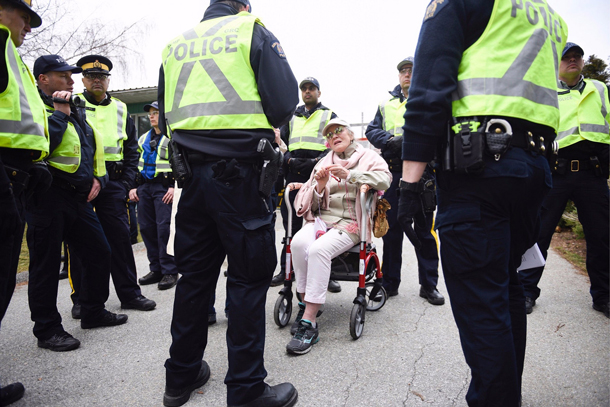
Nearly all of the arrests in protest of the Trans Mountain Expansion Project have been peaceful. Above, one woman who was arrested the same day as Cavanaugh sat on her walker, knitting. (Photo: Rogue Collective, Flickr CC BY-NC-SA 2.0)
CURWOOD: Romilly, walk me through what happened to you on the day you were arrested protesting this pipeline.
CAVANAUGH: So we started off in a soccer field that was close to the Kinder Morgan facility; we gathered there, we started to do our training, we made a commitment to nonviolence, to no weapons, no drugs, no alcohol. And then we started walking through a trail that went through the forest. The Indigenous leaders were at the front, there was drumming and singing and it was this very beautiful and peaceful moment as we walked there. We could hear the birds singing; people commented that there was a combination of sounds -- the sounds of nature and the sounds of construction, because they were taking the trees down at that point -- and as we walked the drumbeat, I've been told, is meant to slow down your heart rate and your heart will be in unison with that beat. So there's a very peaceful feeling that comes over you. As I started walking I thought I don't know if I can do this or not. I've never been arrested before; what will the ramifications be; am I really going to jail? And then as I walked it became very clear I have to do this. And so at that point if I had any doubt about getting arrested, if it was really the right thing to do, all the fears about that went away. So the first group went up to the gate and they used the zip ties to attach themselves to the gate. And then once the police arrived they read out the court injunction, letting people know exactly what it said, and gave them ten minutes to decide if they wanted to remain.
CURWOOD: So at this point you're one of those people who hasn't tied herself to the gate, but you're just standing there.
CAVANAUGH: That's right. So we went up in groups; there were six people to start with. They were arrested, and when that happened a line of police stood in front of the gate so that we couldn't get through. So the organizers had said, cross your hands across your chest, turn your body sideways to the police and try to walk in between the gaps, but say to them "we're passing you, we're just trying to get to the gate;" and the police said "you are not passing." [LAUGHS] So at that point we were told to just sit down; we certainly don't want to get into any kind of a scuffle with the police. So we sat in a row in front of them and one by one they came and arrested each person.
CURWOOD: And so they arrest you and then they take you where?
CAVANAUGH: They took us to a temporary processing area. So they had tables and chairs set up on a trail beside the property. It was interesting because the officer who arrested me -- I said, "well my mom is going to freak out when she sees me on the news," because there was quite a bit of media there the day that I was there. And I said "she thinks I'm at work, so I think she's going to be quite surprised." And he said to me, "At least you stood up for what you believed in." Which I thought was really wonderful, because not all of the police there are in support of this project, but they are doing their job and they're required to be there. So I thought that was an interesting moment.
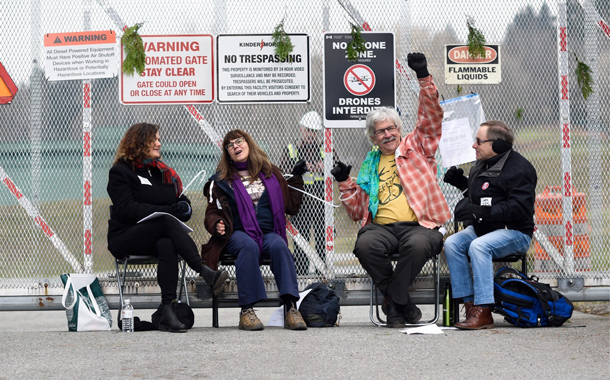
Protestors “chained” themselves to the gate at one entrance to the Burnaby Terminal site using large zip-ties. (Photo: Protect the Inlet)
CURWOOD: So if you were to explain this to, say, a young person, who doesn't really understand how governments and companies and all this work, how would you explain what you did that day and how you feel about it?
CAVANAUGH: Well the reason that I decided to get arrested is because I've seen over and over again that our government is making the wrong choices for the planet and for the people. And when I was younger I really trusted them, naively. In fact when I worked at the pipeline company I'd started to hear about climate change; it wasn't very well known at that time, certainly amongst people in the public. And I really felt the government will take care of it. Because it's in the best interest of the people, and in the best interests of the planet, and isn't that their job? And then decades went by where nothing was happening, and it became more and more clear, it's been thirty years now since the United Nations set up the International Panel on Climate Change. There's thirty years of very hard scientific data backed up by the vast majority of climate scientists around the world. There's consensus on this issue. But the industry did a really good job of muddying the waters, delaying action. They used the same tactics that the tobacco industry used to try to delay action related to cancer being caused by smoking. So as I saw that, and each year was passing, more and more poor decisions were being made by the government like the approval of this project; and I thought, this is ridiculous! If we want change we have to stand up. In a peaceful way, and with knowledge and with commitment. And what's beautiful about this movement is it's bringing people together from lots of other movements as well. There was a representative there from Black Lives Matter. There's people there who are transgendered. There's people there in wheelchairs and with walker; of all races and of all ages; there's youth and there are seniors. There was an elderly woman sitting on her walker, the little chair that the walker has, knitting -- with about twenty police around her. [LAUGHS] You know so these are peaceful, concerned, passionate people and it's wonderful to see that this movement is growing, and that it's very inclusive. So yeah I just realized at that point that it's naive to sit around waiting for the government to do the right thing. If we want the right thing to happen we need to make it happen.
CURWOOD: Back at the Paris climate meeting, I saw Prime Minister Justin Trudeau enthusiastically embracing the process and the Accord and committed to curbing Canada's greenhouse gas emissions. How do those affirmations strike you in view of his approval of this Trans Mountain pipeline to move the tar sands to market?
CAVANAUGH: Well it just doesn't ring true at all. We are very disappointed in Canada, with what has proceeded since that time. So in the past we had Prime Minister Stephen Harper, who was from Alberta. He was very pro oil and gas; we had no expectation that he would take any action on climate change. But then when Trudeau was elected, the people who are concerned about these issues had a sigh of relief and thought, OK now we're on the right track. So he said many beautiful things in Paris, but you can't have that and continue to expand the oil sands, it doesn't make any sense. We have one of the highest per capita greenhouse gas emissions in the world because of the oil sands, because it's such a huge emitter. And I'm not anti-industry and I'm certainly not anti-jobs; and what I believe is those people as well don't really have a future. This is a dying industry, whether it dies in the next five, ten or twenty years, or if we burn every last drop of oil on this planet and really destroy the climate, it will end. It's not a renewable resource. So where is the plan for them? To move forward, to transition over to the clean energy economy?
CURWOOD: Well Romilly, large multinational corporations can be pretty tough to deal with; you and your fellow protesters are up against the company and the approval of the Prime Minister. How hopeful do you feel about the ability for you and your colleagues to make a difference?
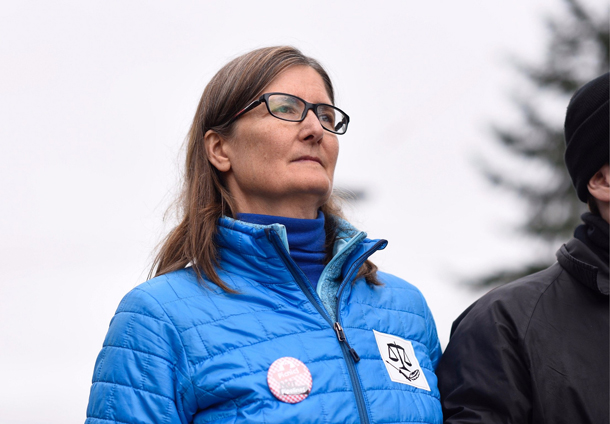
Romilly Cavanaugh is a former Trans Mountain employee who is protesting the Trans Mountain Expansion Project. (Photo: Rogue Collective, Flickr CC BY-NC-SA 2.0)
CAVANAUGH: Well that's a really good question; it does seem very much like a David and Goliath kind of struggle. But I am very hopeful, because we've seen other projects in Canada cancelled, like the Northern Gateway project which would have gone through northern B.C. And would have had a similar impact as what we're seeing now with the Kindred Morgan project. So there's several court cases that are still pending; the Indigenous communities in B.C. Have unceded territory, which means that their territory was never signed over to the English government when the colonialists came here. So the pipeline would be going across unceded territory. But the group that's leading this protest is the Tsleil-Waututh Nation, which is just across the water from where the tanker loading facility would be. And they rely on the fish and the shellfish and a clean environment for their survival, so they're very concerned about protecting the land and the water, which to them is not just a source of sustenance, but it's sacred. So they have a right to protect their land and their water. And the provincial government has also started a court case against the federal government to say that they're concerned about what will happen with the heavy oil if there is a marine spill. There's been inadequate science, inadequate amount of research to determine what the fate would be of that oil. So there are multiple things that could happen to shut this project down; another one is that the investors could just throw their hands up in the air and decide it's not worth it because I don't think they realize just how dedicated the protesters are. So we've had protests here in B.C. But we've also had them all across Canada. And it seems very much like a movement, it seems to be building momentum. So it could go either way but I'm hopeful that that we will be successful with our protests.
CURWOOD: Romilly Cavanaugh is an environmental engineer and now an activist based in Vancouver, Canada. Thanks so much for taking the time with us today.
CAVANAUGH: It was my pleasure. Thank you for having me on your show.
Related links:
- National Observer: “In a packed courtroom, Kinder Morgan pipeline protestors face charges”
- The Star: “Trans Mountain pipeline ‘will be built,’ Trudeau says”
- Vice News: “Trudeau’s Trans Mountain fight isn’t with B.C., it’s with First Nations”
- Protect the Inlet is the First Nations-led group organizing the Trans Mountain protests
- About the Trans Mountain Expansion Project
- A West Coast Environmental Law explanation of the court challenges to the Trans Mountain pipeline
- Rights of Indigenous Peoples in Canada
[MUSIC: Ruben Gonzalez, “Date Una Vueltecita” on Momentos, Cuban Essentials Records]
CURWOOD: Our crew includes Naomi Arenberg, Bobby Bascomb, Savannah Christiansen, Jenni Doering, Jaime Kaiser, Hannah Loss, Don Lyman, Helen Palmer, Aynsley O’Neill, Adelaide Chen, and Jolanda Omari.
Jake Rego engineered our show, with help from John Jessoe. Alison Lirish Dean composed our themes. You can hear us anytime at L-O-E dot org - and like us, please, on our Facebook page - PRI’s Living on Earth. And we tweet from @livingonearth. I’m Steve Curwood. Thanks for listening!
ANNOUNCER1: Funding for Living on Earth comes from you, our listeners, and from the University of Massachusetts, Boston, in association with its School for the Environment, developing the next generation of environmental leaders. And from the Grantham Foundation for the protection of the environment, supporting strategic communications and collaboration in solving the world’s most pressing environmental problems. Support also comes from the Energy Foundation, serving the public interest by helping to build a strong, clean, energy economy, from Carl and Judy Ferenbach of Boston, Massachusetts and from SolarCity, America’s solar power provider. SolarCity is dedicated to revolutionizing the way energy is delivered by giving customers a renewable alternative to fossil fuels. Information at 888-997-1703. That’s 888-997-1703.
ANNOUNCER 2: This is PRI, Public Radio International.
Living on Earth wants to hear from you!
Living on Earth
62 Calef Highway, Suite 212
Lee, NH 03861
Telephone: 617-287-4121
E-mail: comments@loe.org
Newsletter [Click here]
Donate to Living on Earth!
Living on Earth is an independent media program and relies entirely on contributions from listeners and institutions supporting public service. Please donate now to preserve an independent environmental voice.
NewsletterLiving on Earth offers a weekly delivery of the show's rundown to your mailbox. Sign up for our newsletter today!
 Sailors For The Sea: Be the change you want to sea.
Sailors For The Sea: Be the change you want to sea.
 The Grantham Foundation for the Protection of the Environment: Committed to protecting and improving the health of the global environment.
The Grantham Foundation for the Protection of the Environment: Committed to protecting and improving the health of the global environment.
 Contribute to Living on Earth and receive, as our gift to you, an archival print of one of Mark Seth Lender's extraordinary wildlife photographs. Follow the link to see Mark's current collection of photographs.
Contribute to Living on Earth and receive, as our gift to you, an archival print of one of Mark Seth Lender's extraordinary wildlife photographs. Follow the link to see Mark's current collection of photographs.
 Buy a signed copy of Mark Seth Lender's book Smeagull the Seagull & support Living on Earth
Buy a signed copy of Mark Seth Lender's book Smeagull the Seagull & support Living on Earth

